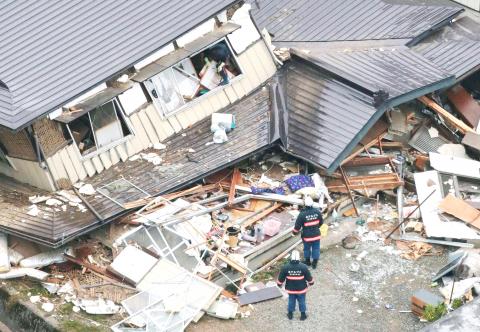Helicopter surveys yesterday showed more extensive damage than earlier thought from an overnight earthquake in the mountainous central Japan area that hosted the 1998 Winter Olympics.
At least 37 homes were destroyed in two villages, and 39 people were injured across the region, including seven seriously, mostly with broken bones, officials said.
The magnitude 6.7 earthquake struck shortly after 10pm on Saturday west of Nagano at a depth of 10km, the Japan Meteorological Agency said. The agency revised the magnitude from a preliminary 6.8 while the US Geological Survey measured it at 6.2. Since the quake occurred inland, there was no possibility of a tsunami.

Photo: Reuters
Ryo Nishino, a restaurant owner in Hakuba, a ski resort village west of Nagano, told Japanese broadcaster NHK that he had “never experienced a quake that shook so hard. The sideways shaking was enormous.”
He said he was in the restaurant’s wine cellar when the quake struck, and that nothing broke there.
Japan’s Nuclear Regulation Authority said no abnormalities were reported at three nuclear power plants in the affected areas. All of Japan’s nuclear plants are offline following a magnitude 9 earthquake and massive tsunami in 2011 that sent three reactors at the Fukushima Dai-ichi plant into meltdown. Fukushima is about 250km northeast of where Saturday’s earthquake occurred.
The hardest-hit area appeared to be Hakuba, which hosted events in the 1998 games. At least 30 homes were destroyed, and 17 people injured, the Nagano Prefecture government said. Another seven homes were lost in Otari, a nearby village to the north. Non-residential buildings were also destroyed, with officials still assessing the extent.
Japanese television footage showed buildings in various states of collapse, some flattened and others leaning to one side, and deep cracks in the roads. A landslide spilled onto a railroad track, forcing service to stop.
Shigeharu Fujimori, a Nagano prefecture disaster management official, said it was fortunate there have not been any deaths reported, despite the extent of the damage.
All 21 people trapped under collapsed houses were rescued, with two of them injured, the National Police Agency told the Kyodo news agency.
“The hardest-hit area was in the mountains and sparsely populated, where neighbors have a close relationship and help each other,” Fujimori said. “So I don’t think anyone has been forgotten or left isolated.”
Shinkansen bullet train service in the region was restored after a short interruption. Chubu Electric Power Co said 200 homes were still without power yesterday.
The quake was followed by more than 45 aftershocks, and Meteorological Agency official Yohei Hasegawa urged residents to watch out for landslides.

BUILDUP: US General Dan Caine said Chinese military maneuvers are not routine exercises, but instead are ‘rehearsals for a forced unification’ with Taiwan China poses an increasingly aggressive threat to the US and deterring Beijing is the Pentagon’s top regional priority amid its rapid military buildup and invasion drills near Taiwan, US Secretary of Defense Pete Hegseth said on Tuesday. “Our pacing threat is communist China,” Hegseth told the US House of Representatives Appropriations Subcommittee on Defense during an oversight hearing with US General Dan Caine, chairman of the Joint Chiefs of Staff. “Beijing is preparing for war in the Indo-Pacific as part of its broader strategy to dominate that region and then the world,” Hegseth said, adding that if it succeeds, it could derail

CHIP WAR: The new restrictions are expected to cut off China’s access to Taiwan’s technologies, materials and equipment essential to building AI semiconductors Taiwan has blacklisted Huawei Technologies Co (華為) and Semiconductor Manufacturing International Corp (SMIC, 中芯), dealing another major blow to the two companies spearheading China’s efforts to develop cutting-edge artificial intelligence (AI) chip technologies. The Ministry of Economic Affairs’ International Trade Administration has included Huawei, SMIC and several of their subsidiaries in an update of its so-called strategic high-tech commodities entity list, the latest version on its Web site showed on Saturday. It did not publicly announce the change. Other entities on the list include organizations such as the Taliban and al-Qaeda, as well as companies in China, Iran and elsewhere. Local companies need

CRITICISM: It is generally accepted that the Straits Forum is a CCP ‘united front’ platform, and anyone attending should maintain Taiwan’s dignity, the council said The Mainland Affairs Council (MAC) yesterday said it deeply regrets that former president Ma Ying-jeou (馬英九) echoed the Chinese Communist Party’s (CCP) “one China” principle and “united front” tactics by telling the Straits Forum that Taiwanese yearn for both sides of the Taiwan Strait to move toward “peace” and “integration.” The 17th annual Straits Forum yesterday opened in Xiamen, China, and while the Chinese Nationalist Party’s (KMT) local government heads were absent for the first time in 17 years, Ma attended the forum as “former KMT chairperson” and met with Chinese People’s Political Consultative Conference Chairman Wang Huning (王滬寧). Wang

CROSS-STRAIT: The MAC said it barred the Chinese officials from attending an event, because they failed to provide guarantees that Taiwan would be treated with respect The Mainland Affairs Council (MAC) on Friday night defended its decision to bar Chinese officials and tourism representatives from attending a tourism event in Taipei next month, citing the unsafe conditions for Taiwanese in China. The Taipei International Summer Travel Expo, organized by the Taiwan Tourism Exchange Association, is to run from July 18 to 21. China’s Taiwan Affairs Office spokeswoman Zhu Fenglian (朱鳳蓮) on Friday said that representatives from China’s travel industry were excluded from the expo. The Democratic Progressive Party government is obstructing cross-strait tourism exchange in a vain attempt to ignore the mainstream support for peaceful development